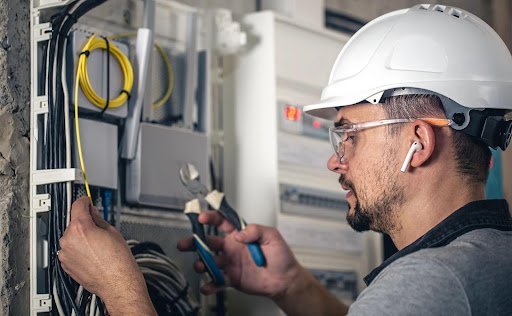In the intricate world of electrical services, understanding the hierarchy within the industry is crucial. Selecting the right electrician is not just about convenience; it ensures safety and efficiency in every electrical undertaking. Electricians play a pivotal role in making sure our homes and businesses are wired correctly and safely, a task that requires utmost precision. Amongst the different types of electricians present, distinguishing the difference between Level 1 and Level 2 electricians is essential for making informed decisions. The primary goal of this article is to clarify the differences between these two levels, helping readers choose the right professional for their needs.
Understanding the Responsibilities of Level 1 Electricians
Level 1 electricians are typically tasked with fundamental electrical services. They specialise in the installation, maintenance, and repair of electrical systems. Whether it’s a new home needing its first electrical layout or a commercial space that requires ongoing electrical maintenance, Level 1 electricians provide the foundational services that keep electrical systems functional. These professionals manage residential projects like wiring new lighting fixtures and commercial tasks such as maintaining electrical equipment in a warehouse.
To operate as a Level 1 electrician, individuals must meet specific qualifications and certifications. These requirements vary across regions, but generally include completing an apprenticeship and obtaining a certificate that demonstrates their competency. Safety and efficiency are crucial aspects of their daily responsibilities, demanding adherence to industry standards and regulations. By utilising their extensive training, Level 1 electricians ensure that basic electrical systems are installed and maintained without any hitches.
Delving into Level 2 Electricians’ Expertise
Level 2 electricians possess advanced skills that extend beyond the capabilities of their Level 1 counterparts. They handle more complex projects, including dealing with live wires, resolving power outages, and working on high-voltage installations. These specialists are often called upon to connect and disconnect properties from the electrical network, a task that requires heightened precision and safety measures.
The path to becoming a Level 2 electrician involves additional training and certification, which prepares them for handling the increased risks associated with their work. For instance, they might work on a live network or install and repair underground cabling. Their expertise is essential in scenarios such as restoring power after a blackout or setting up a large-scale commercial project requiring extensive electrical infrastructure.
Key Differences Between Level 1 and Level 2 Electricians
The distinction between Level 1 and Level 2 electricians is significant. While Level 1 electricians manage standard electrical services, Level 2 electricians tackle more advanced, higher-risk projects. The scope of work for Level 2 electricians includes tasks that require a deeper understanding of complex systems and the capability to handle more dangerous situations, such as working with live wires and high-voltage electrical components.
Level 2 electricians generally command higher fees due to their advanced skills and the complexity of tasks they perform. Opting for a Level 2 electrician might be more beneficial when there is a high-risk project involved or when specialised tasks require their expertise. This highlights what makes Level 2 Electricians different and why their role is indispensable in many residential, commercial, and industrial projects.
Factors to Consider When Choosing Between a Level 1 and Level 2 Electrician
When deciding between hiring a Level 1 or Level 2 electrician, it’s important to assess the complexity of the task at hand. For simple installations or routine maintenance, a Level 1 electrician may be sufficient. However, for more complicated or hazardous scenarios, investing in a Level 2 electrician is likely warranted due to their specialised skills.
Checking the credentials and verifying the qualifications of the electrician chosen is paramount. This ensures not only the quality of the work but also the safety and compliance with local regulations. Balancing cost against expertise is a crucial consideration; while a Level 2 electrician might come at a higher cost, their expertise can lead to long-term savings by preventing future issues.
The urgency of the project should also influence the decision. Certain circumstances may demand the prompt intervention of a Level 2 electrician to secure electrical safety and compliance.
Common Projects and Services: Level 1 vs Level 2 Electricians
Level 1 electricians are typically suitable for routine projects such as installing new light fixtures or performing scheduled maintenance on existing systems. Their services cover the day-to-day electrical needs of most residential and some commercial properties.
In contrast, Level 2 electricians take on more advanced tasks like major installations, emergency repairs, or any project involving the electrical network and live systems. They are essential for high-risk scenarios that demand specialised knowledge and experience, such as connecting a new build to the electricity grid or dealing with the aftermath of a power outage.
Understanding the types of projects that each level of electrician undertakes helps in making an informed decision. Once the requirements of a project are identified, the next step would be to reach out to a qualified electrician who best fits those needs.
Wrapping It Up: Choosing the Right Electrician
Understanding the key differences between Level 1 and Level 2 electricians is essential in making the right choice for any electrical project. While Level 1 electricians cover the basics, Level 2 professionals handle more complex and risky tasks. Considering the expertise required against project needs helps ensure both safety and effectiveness.
It’s wise to evaluate the scope and urgency of any project while verifying an electrician’s credentials. The safety and compliance of an electrical system often hinge on the expertise of the chosen professional. When in doubt, seeking advice from an experienced electrician can deliver optimal outcomes for any electrical situation. Choose wisely, and you’ll have the peace of mind that your electrical systems are in capable hands.
YOU MAY ALSO LIKE: Choosing the Right Local Cabinet Maker for Your Home Renovation











